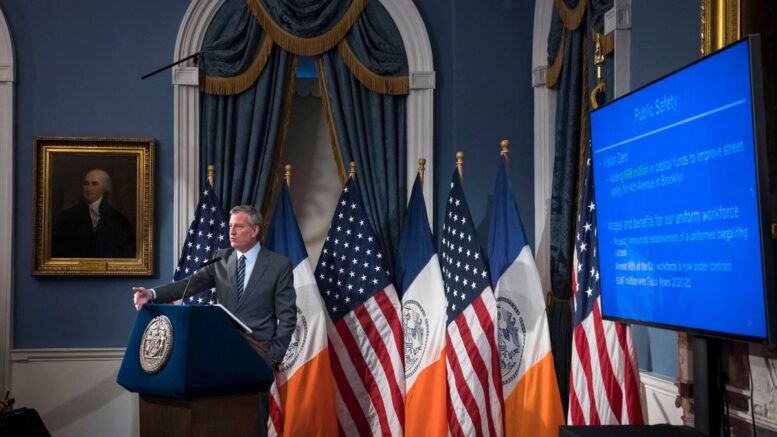Mayor Bill de Blasio on Thursday proposed a $95.3 billion preliminary budget for the coming fiscal year that reflects $3.1 billion in growth over last year’s model — but offers no new big-ticket items.
The mayor said he had wanted to include new programs in the budget for the 2021 fiscal year, which starts July 1. But uncertainties stemming from a projected state budget gap of more than $6 billion made it the wrong time for new programs.
The bulk of the deficit is attributed to Medicaid shortages, which the mayor said he fears could mean harmful cuts for the city’s public hospitals system.
Gov. Andrew Cuomo is expected on Tuesday to unveil his proposal for the upcoming state budget, which the mayor said would determine the city’s next move.
“This is normally in the budget presentation where you get into the juicy part, where there’s all sorts of wonderful new initiatives,” de Blasio said during a press conference on the proposed budget at City Hall.
“That’s not happening right now,” he added. “The city is being very careful at this moment.”
No Juice, But Rising Costs
However, the lack of new initiatives didn’t head off significant new costs attached to personnel, program expansions and some new mandates.
The expected tab for new labor contracts added the largest chunk of funding for the budget: $1.6 billion. That’s based on assuming unions that are still negotiating contracts with City Hall will accept raises similar to deals already struck.
The mayor said money for special education staffing is also being boosted — by $274 million — as is required funding for charter schools, running an additional $93 million.
Statewide criminal justice reforms that went into effect this year — including changes to discovery rules in court trials and the push to reduce reliance on bail — will add $175 million in new costs for the city, budget officials said.
The largest bulk of those expenses — $104 million — is for supervised release measures in anticipation of fewer people being held in jail on bail.
Nearly $60 million will go to hire nearly 1,000 people across a number of agencies that intersect with criminal justice, including 729 staffers from the city’s five district attorneys’ offices.
The NYPD will add about 250 non-uniform personnel as well, officials said.
The added expenses were measured compared to June 2019 projections of future costs.
Budget watchdogs credited the mayor for holding the line when it comes to new programs but said he hadn’t done enough to buffer the city from potentially massive cuts from the state.
No ‘Rainy Day’ Boost
“Greater spending restraint would allow the city to bolster its fiscal position,” said Citizens Budget Commission president Andrew Rein. “In November, New Yorkers voted resoundingly for the creation of a ‘rainy day fund,’ yet this budget does not include any additional contributions to reserves the city already has.”
The city also added significant new spending to the current fiscal year — the most tacked on in a preliminary budget since 2016.
The $441 million in new agency expenses includes $150 million for tuition reimbursement for parents who put their kids in private special education schools because the public schools can’t offer them an appropriate placement or services.
Budget officials revealed that the total cost for such reimbursements hit $500 million in fiscal 2019 — more than double the $222 million spent in fiscal 2014.
That figure is budgeted for $540 million in the current fiscal year, which ends June 30.
The mayor attributed the increase to the city’s less-combative approach to complaints filed by parents of special education students, and offered it as a sign that more students are getting the proper services.
But the complaint system is overrun with more than 10,000 open cases and favors parents with the means to hire lawyers or pay other significant costs for services up front.
Despite a time limit of 75 days to resolve complaints, cases are currently stretching to 259 days on average, the latest numbers show.
The article was published at Mayor’s $95.3 Billion Proposed Budget Adds Costs, Not Programs.

Be the first to comment on "Mayor’s $95.3 Billion Proposed Budget Adds Costs, Not Programs"